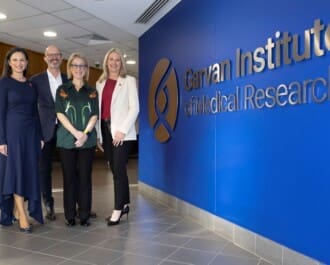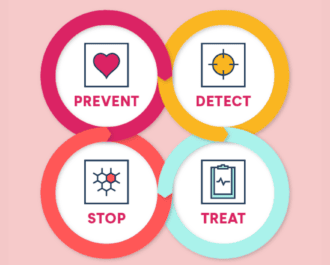
There are various risk factors linked to breast cancer but the association between pregnancy and breast cancer is well established. Having children can decrease the risk of developing breast cancer, but the older a woman is when she has her first child the less protection is gained. Breastfeeding also offers some protection, with every 12 months of feeding associated with a 5% decrease in the mother developing breast cancer.
In Australia, breast cancer is the second most common cancer diagnosed during pregnancy after melanoma, with and incidence of 7.3 per 100,000 women giving birth. Breast cancer that is associated with pregnancy is more likely to spread to other parts of the body, becoming more difficult to treat and resulting in lower survival rates. Hence, it is important to understand why breast tumours that are associated with pregnancy are more aggressive, and how we can more effectively treat pregnancy-related breast cancer.
These questions are also becoming more important due to the changing demographics of mothers. Women are now older when they have their first child than in previous generations. Similarly, there is a global decrease in the proportion of women who breastfeed their child. These changes contribute to the rise in breast cancer incidence, and especially to pregnancy-related breast cancer.
Now, a new study co-led by Professor Christopher Ormandy (Garvan Institute of Medical Research) and Associate Professor Samantha Oakes (NBCF Early Career Fellow and now the Director, Research Investment NBCF), has identified a potential new therapeutic target for these pregnancy-related tumours.

Associate Professor Sam Oakes
The team have identified a gene called Oas2, which is crucial in detecting and initiating a defence against viruses. The gene was activated via a change in the sequence of the gene, and when examined in a mouse model of breast cancer, resulted in reduced pregnancy-induced metastasis. In addition, the mice with the altered Oas2 gene also responded better to a specific type of immunotherapy.
A/Prof Oakes explained that this discovery could open the door to new treatment options for many women.
“Therapeutic targeting of the Oas2 gene may be useful as an anti-metastatic treatment for women with pregnancy-induced metastasis, but also those with other forms of breast cancer,” she said.
“In addition, we have shown that this gene can be manipulated to enhance immunotherapy responses in breast cancer, which may help to improve outcomes with existing treatments.”
The study was published in the journal Breast Cancer Research and A/Prof Oakes was proudly supported through National Breast Cancer Foundation training and early career fellowship grants.
More News Articles
View all News


